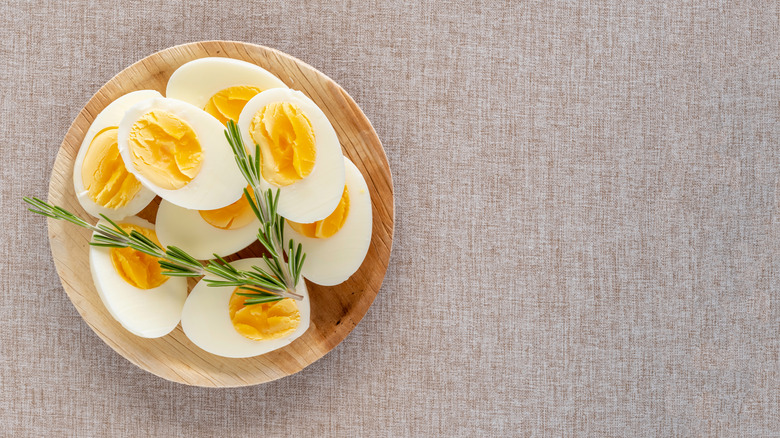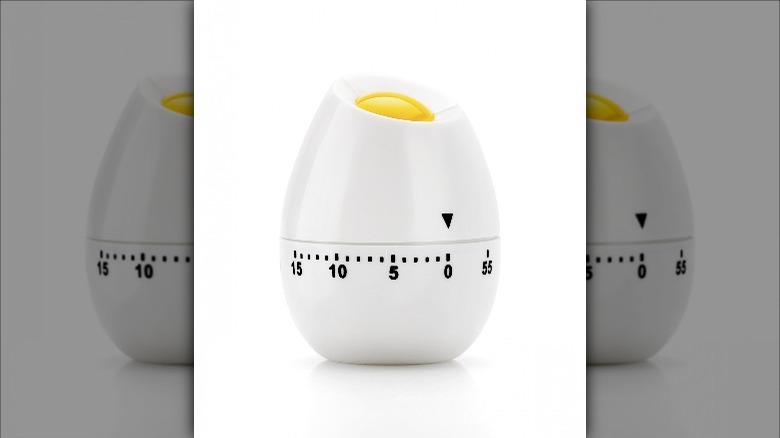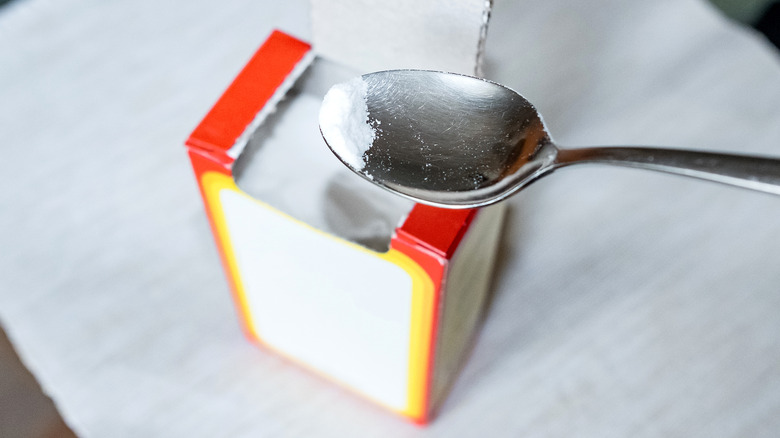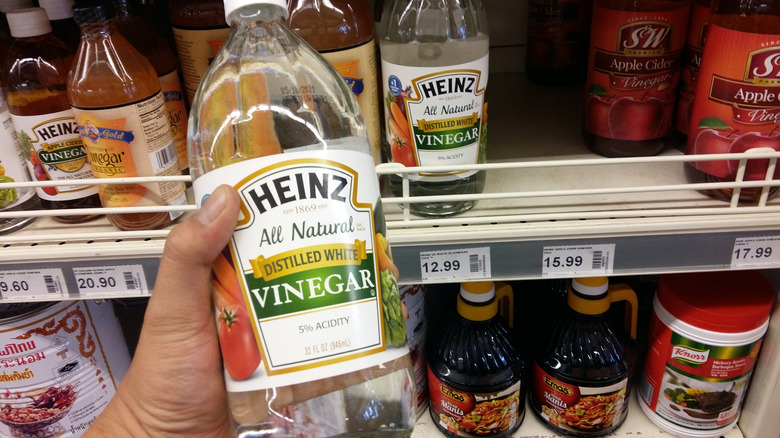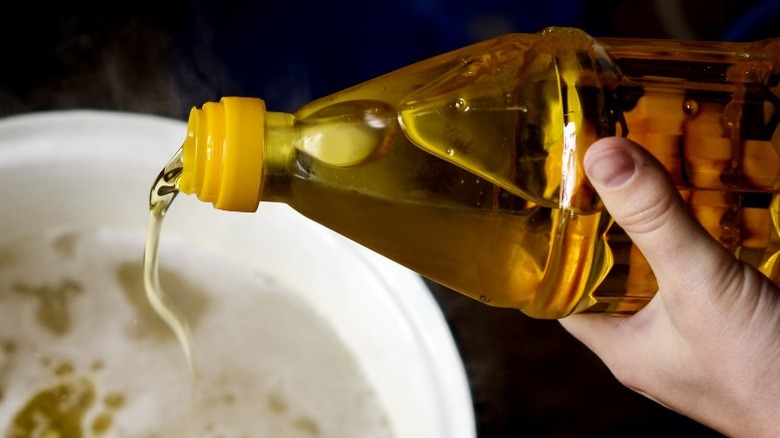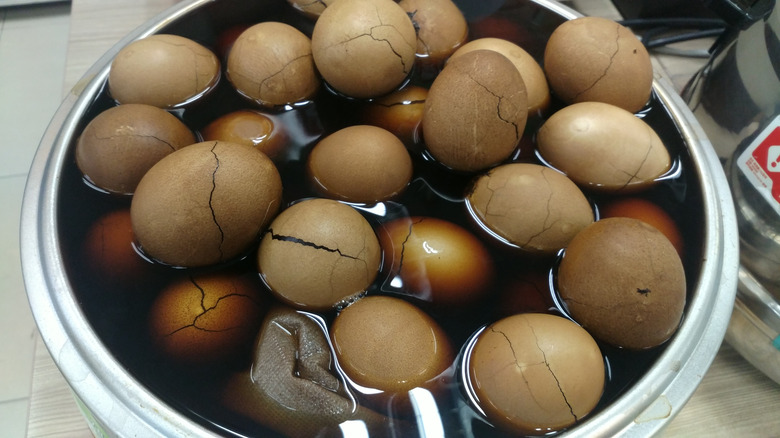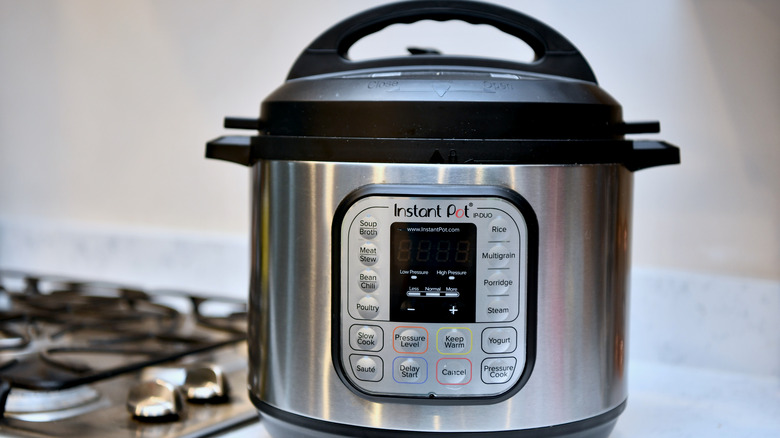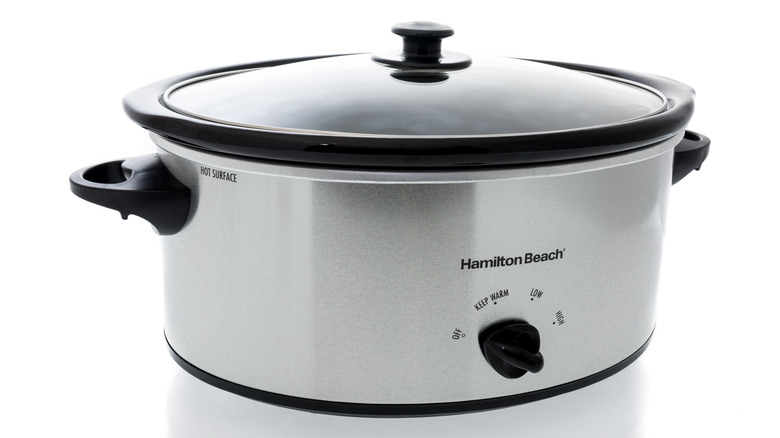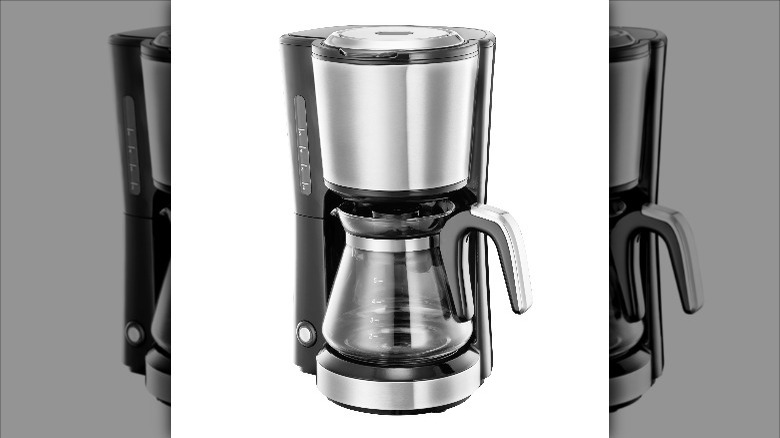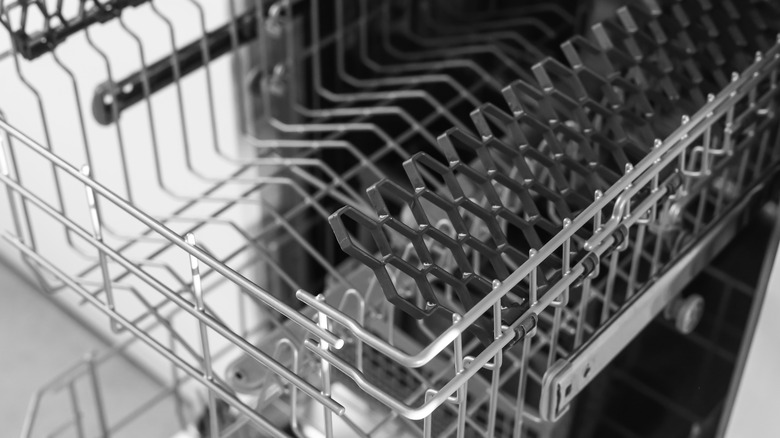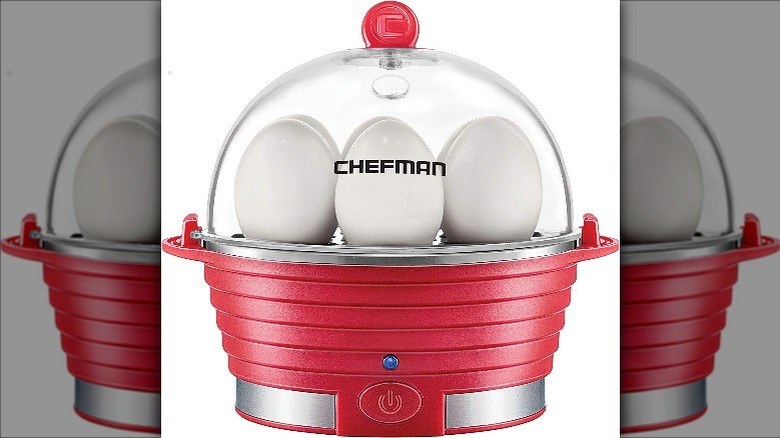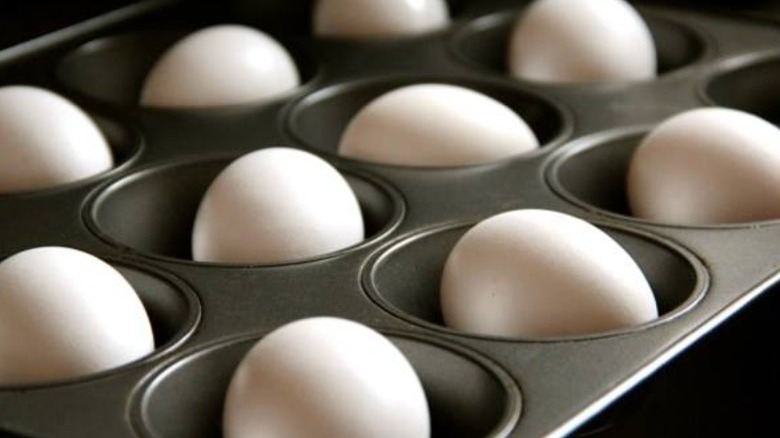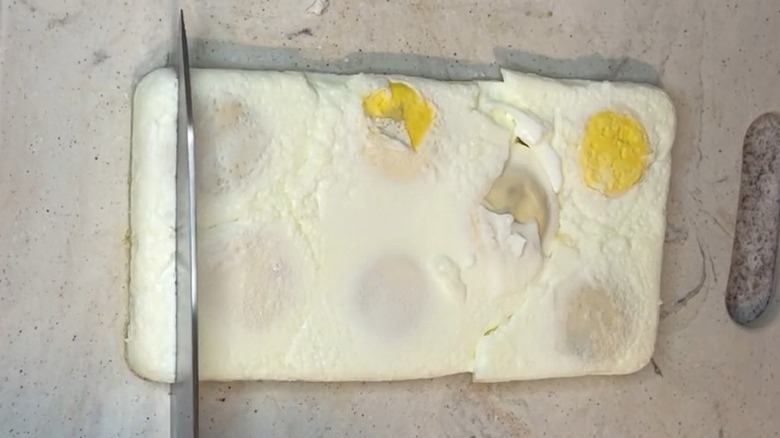Hacks That Will Make Boiling Your Eggs So Much Easier
We may receive a commission on purchases made from links.
The boiled egg may just be one of nature's perfect foods — well, nature in combination with a little bit of culinary art, that is. Unless there's a lost tribe of chickens living in a volcano somewhere, we doubt any of the species are capable of laying eggs that come out pre-cooked. Boiled eggs deliver plenty of protein, lots of vitamins and minerals, and hardly any carbs — all in a neat, compact, and modest 75-calorie package that's easy to crack open (and entirely biodegradable).
While boiled eggs are perfectly fine with just a sprinkle of salt and pepper, you can add a few additional ingredients and turn them into egg salad, deviled eggs, Scotch eggs, and shoyu tamago (those are the marinated eggs that go perfectly with a bowl of ramen).
Boiling an egg might seem like a pretty straightforward process, but there's always room for improvement. One problem with boiled eggs comes when trying to remove the shells, only to find that large chunks of the cooked egg white come off, too. Some of the hacks on this list are meant to help prevent that from happening, while others include various ways to boil eggs without a pot of water. We've also included tips on how to make sure your eggs are cooked for the proper amount of time along with advice on infusing them with flavor as they boil.
Understand the timing
When first you set out to boil an egg, it's best to know just how cooked you want that egg to be. They can range from soft eggs with runny yolks (and still slightly wobbly whites) to hard-cooked ones where both the whites and yolks are completely firm. You may want an egg with a slightly soft yolk to top off a bowl of noodles or a salad, while a much firmer yolk works best for sauce gribiche. Egg Info has provided a handy guide for how long to boil an egg in order for it to reach each different stage.
In order to time your eggs just right, start with a pan of cold water and begin the timing once the water begins to boil. A cooking time of three minutes makes for an egg with a really soft yolk and semi-soft white. After four minutes, you'll have one where the white is mostly set but the yolk's still runny. At five minutes, the white of the egg will be firm and contain jammy yolk. The yolk of a six-minute egg will still be a bit soft, while seven minutes of cooking leads to a standard hard-boiled egg. After eight to 10 minutes, your eggs will come out extra well-done. The times given are for large eggs, so you'll need to subtract a minute for medium ones and add one on if you're cooking the extra-large kind.
Add baking soda to your boiling water for easy-peel eggs
When it comes to anything food-related, fresh is always best, right? Well, not in every instance. Some things are better with a little age on them, like fine wines, ripe cheeses, and eggs. Yes, eggs! In his classic "On Food and Cooking: The Science and Lore of the Kitchen," food scientist Harold McGee advises that "the best guarantee of easy peeling is to use old eggs!" (Yes, he uses the exclamation point and everything, so obviously he has strong feelings on the subject.) The reason for this is that the albumen of older eggs has a higher pH, which causes it to cling less tightly to the shell membrane once the egg has been cooked.
This is all very well and good, but as Wired points out, eggs are getting fresher and fresher these days as our food supply chain becomes more efficient. Both artisanal eggs and the plain old factory-farmed supermarket kind are practically whisked right from the nest to store shelves without much ripening time. Luckily, McGee has a simple solution for this: He suggests adding half a teaspoon of baking soda per quart of water used to boil the eggs, although it might make them taste a tad like sulfur. Eggs are already on the sulfurous side, though, so you may not notice much difference in flavor.
Vinegar may help keep your eggs intact
The one problem with using older eggs for boiling is that while their higher, more alkaline ph makes them easier to peel, it could also make them more prone to cracking. How can you fix that problem? The Survival Freedom website suggests adding a small amount of vinegar to the cooking water. It is to be noted that the vinegar won't actually prevent the eggshell from developing cracks as it cooks. Instead, it will work on the albumen inside the shell, strengthening it so that if the shell does crack, the egg white will stay inside the sac instead of spilling out into the boiling water. The vinegar also helps the egg whites to congeal more quickly, and a congealed white is not a leaky white.
You can use any type of vinegar for your egg water, and lemon juice will work as well. But distilled white vinegar is bound to be the cheapest option. As for the amount you'll need, they suggest 2 teaspoons per cup or about 3 tablespoons per quart. (2 tablespoons + 2 teaspoons if you want to adhere to the exact ratio.) Do not, however, let your eggs sit in the vinegar water after you've finished cooking them, as vinegar will eventually dissolve the shells. Instead, remove the eggs from the hot water (a slotted spoon will help with this) and let them sit in a cold-water bath to help loosen the shells before peeling.
Oil can also help with peeling boiled eggs
Oil and water do not mix, or so the old saying goes. Although as the Institute of Food Technology Magazine points out, they definitely do mix when it comes to the process of emulsion. Still, that's neither here nor there as far as our next egg hack goes. Here we are relying on adding oil to water — not combining them — to help make the boiled eggs easier to peel.
As per Bowl of Delicious, if you pour a tablespoon or two of any cooking oil into the pot that you're boiling the eggs in, it will manage to penetrate the porous shells and somehow form a layer of lubrication between the membrane and the egg white. This means that when it comes time to peel the eggs, the shells will just slide right off! Well, kind of. It's not quite that easy, but it's allegedly a lot easier to de-shell oiled boiled eggs versus the kind that's been cooked in water alone.
Add some flavor as the your eggs boil
With eggshells being so porous, why not boil eggs in broth or some similar flavoring agent? While you don't see too many recipes calling for this technique, several cooks on Stack Exchange's Seasoned Advice forum swear that it does work and is something they do all the time. As one forum user explains, "while the egg is still uncooked, it will take on the tastes of outside ingredients fairly easily." As the white hardens, it becomes resistant to picking up any flavors in the water. But during those first few minutes of boiling time, it will be receptive to them.
One cook notes that they "can always tell the difference" if they've boiled eggs in water with vinegar or without. Another cook shares that they "routinely throw eggs in seafood boils and sometimes boil only eggs in crab boil or other seasonings (Old Bay, etc.)." Still another person shares how 7-Elevens in Taiwan boil eggs in a slow cooker with tea bags, saying that "the eggs turn out brown all the way through [and] longer cook[ing] results in a deeper brown color." These tea eggs, which are also a popular snack in China and other Asian countries, don't just pick up the color, they also get plenty of flavor from the tea and other seasonings used in their preparation.
Yes, you can use your instant pot to boil eggs
Whether you received an Instant Pot for the holidays or bought one on Black Friday, you may be on the lookout for cooking techniques that puts this wonder appliance to work. Some Instant Pot enthusiasts insist that pressure-cooking is the very best way to boil an egg — as per A Mind Full Mom blog, Instant Pot boiled eggs are absolutely "FOOL-PROOF" (shouting intended). They go on to explain that Instant Pot boiled eggs have yolks that never turn green and their shells just slip right off.
If you'd like to give Instant Pot egg cooking a try, just follow the "rule of fives," meaning it should take five minutes for the pot to heat/pressure up (your results may vary), five minutes to cook the eggs, five more minutes to release the steam, and then a final five minutes for the eggs to soak in cold water. (So, about the same amount of time as boiling eggs on the stove.) To get started, pour a cup of cold water into the inner pot, place the eggs on a rack (they make special egg racks if you do this a lot), seal the pot, and set it to cook on high pressure for five minutes. Once the time is up, let the steam release naturally for five minutes, then carefully remove the eggs to a bowl of cold water for the final five-minute increment.
Your crockpot also makes for a good egg boiler
If you haven't succumbed to peer pressure-cooking and are proudly Instant Pot-free, you may be interested to know that the good old slow cooker can make for a perfect egg boiling device. This is a great way to cook them if you want boiled eggs on hand to use in a recipe to be named later, but you don't need them right away. As with most crockpot cookery, this egg cooking method is pretty set-and-forget.
While there are those who claim that eggs can be cooked in the crockpot without using any water, this method has never worked for them. Besides, tap water is basically free, so no need to omit it. Instead, put your eggs in the pot in a single layer, cover them with water, then add some salt. Cook the eggs on high for 2 ½ hours, but don't let the pot switch over to the "keep warm" setting once they're done. After 2 ½ hours, a few more minutes of heat probably won't hurt the eggs too much, but it's best to get them out of hot water and into a cold bath soon after the cooking time is up. After a few minutes of chilling in cold water, these slow-boiled eggs will be ready to peel and eat.
You can even boil eggs in your coffee maker
Even if you don't have a slow cooker, you may still be able to get in on the egg-cooking gadgetry as long as you own a 12-cup coffee maker. Even a smaller one might work — LeafTV notes that you should be able to fit two eggs into the mini coffee pots that come as standard equipment in many motel rooms. A standard coffee carafe, however, may fit up to half a dozen eggs.
To commence the coffee pot egg cookery, fill the water reservoir up all the way, put your eggs in the carafe, and then just hit the start button. The coffee maker will heat the water to near-boiling, pour it over the eggs, and then keep the burner warm while they cook. After five or six minutes, you'll have soft-boiled eggs, while 10 to 12 minutes will give you hard-boiled ones. Keep the eggs in the carafe as you carefully pour out the hot water, then fill it up with cold water and let the eggs sit until they are cool enough to peel.
Or dare to use your dishwasher
Long before home sous vide machines were readily available, kitchen hackers discovered that you could obtain a similar effect via cooking foods in your dishwasher. If you're firing up the machine solely for the purpose of cooking your eggs, it's neither a time nor energy-efficient method. If you don't mind multitasking, however, you can always boil up a batch of eggs while you use the dishwasher for its intended purpose.
But wait, you may ask, won't the eggs taste all soapy? After all, we just explained how shells are porous and flavors in the water can seep into the egg whites. Well, the secret to dishwasher cooking lies in creating an air (and soap)-tight seal. What you're going to need to do is to find some screw-top glass jars to hold your eggs. Put the eggs in the jars, fill the jars up with water, screw on the lids, and let the dishwasher run. Assuming your water temperature is set to 140 F, an hour-long cycle will provide you with a batch of soft-boiled eggs and plenty of clean dishes to plate them.
Electric egg cookers are also a thing
Do you boil a bunch of eggs on a regular basis? Maybe you're following the keto diet, or you get invited to a lot of picnics. Perhaps you believe that an egg a day keeps the doctor away — whatever your reasons may be, you just may want to invest in an electric egg cooker. In fact, it's really not that much of an investment. As SF Gate enthuses, their idea of a "perfect" breakfast starts with an egg cooker they purchased for under $12. (Amazon seems to have hiked the price up to $12.75 at the time of publication — darn inflation!)
So what does an electric egg cooker do that make it worth the counter space? This one will boil half a dozen eggs just the way you like them — soft, medium, or hard — and comes with a cup that lets you measure the precise amount of water. It also comes with a tray that the eggs can stay in while you pull them out and douse them with cold water. There are even trays for cooking de-shelled eggs: cook the eggs whole and they're poached; stirred, and they become an omelet. So is this an appliance you can't live without? Maybe. But at any rate, it's cheap enough to give it a go as long as you have room in your kitchen.
Boil eggs without water in the oven
All the methods of egg boiling we've covered so far have one thing in common — they involve hot water. Actually, by definition, a boiled egg pretty much requires that water be used in the cooking process. Otherwise, it's not truly boiled. Technically, then, these oven-boiled eggs are a bit of an oxymoron, but the fact that they're baked in the shells does result in an end product that's pretty darn close to the water-cooked kind. Plus, you don't need to worry about splashing yourself while pouring the boiling water down the drain.
To make these baked-boiled eggs, you'll need a muffin pan. Put an egg in each cup, then put the pan in a preheated 325 F oven. According to a handy chart put together by Wholesome Yum, after 20 minutes of cooking time, your eggs will be soft-boiled but still very runny. At 25 minutes, the eggs will be medium-boiled with soft yolks, while at 30 minutes you'll have a fully-set hard-boiled egg. Once you take the baked eggs out of the oven, you'll still need to plunge them into cold water to stop the cooking process and prepare them for peeling.
Use this no-peel TikTok trick
TikTok cooking hacks can be pretty hit-or-miss, but some of them are fairly legit — at least if you know what you're getting. With this viral TikTok video about making no-peel-boiled eggs, the no-peel part is true, but describing it as "boiled" is a bit of a stretch. In fact, these are just baked eggs —pure and simple. The same ones you'd get if you cracked eggs into muffin cups, ramekins, or avocado halves.
The twist here seems to be that the eggs are cooked not in individual servings, but in a loaf pan. The TikTok creator just cracks the eggs into a greased pan, and places that pan into a larger one that's been half-filled with water (this is called a bain-marie if you want the proper terminology). She cooks the pan at 350 F for half an hour, and the result is a solid rectangle of unembellished eggs that can be chopped up and used in egg salads or similar preparations.
The thumbtack hack that is pretty genius
Perhaps you've looked over this list and decided that you'll be sticking to the tried and true method of boiling your eggs the Merriam-Webster way, or, "subject[ing them] to the action of a boiling liquid." After all, you really can't beat a cooking method that's been serving humankind for the past 30 millennia. Still, there's one last egg-boiling hack you really ought to try, courtesy of Julia Child's BFF, Jacques Pepin. In order to perform it, all you'll need is a thumbtack (clean, of course) as well as an uncooked egg.
Once you've got the thumbtack in one hand and the egg in the other, locate the larger end of the egg then use the tack to poke a tiny hole in the shell. Now, boil your egg as usual. What you've just done is to (maybe) allow some of the gasses to escape from inside the egg and/or let a tiny bit of the cooking water seep inside. Either or both of these events are said to help make your egg easier to peel, while the former may also keep the egg from cracking while it cooks. We may not be exactly how the thumbtack trick works, but the Pepin endorsement alone is good enough for us.
